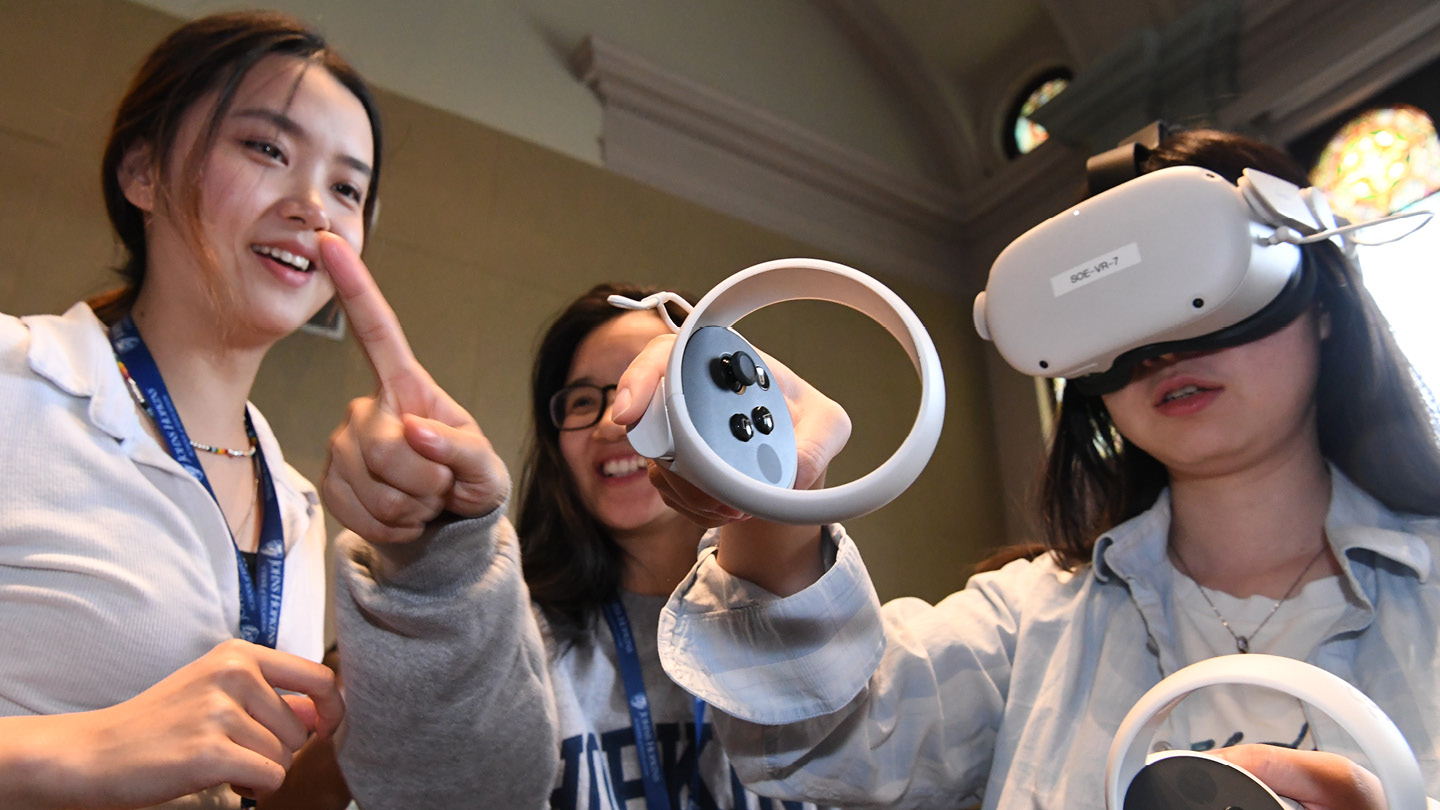Prepare to lead and shape the future of educational technology and training with a master’s degree from the Johns Hopkins Learning Design and Technology program. You will learn principles and practices from the learning sciences and gain hands-on skills in designing, delivering, and evaluating innovative and evidence-informed technology-supported learning experiences and pedagogies to improve learning outcomes in a wide range of settings.
After graduating from this newly launched 30-credit online master’s degree program, you will be equipped to lead with vision and responsibility, ensuring that technology serves all learners and their communities. You will be ready to navigate the technical, social, ethical, and political dimensions of technology use, prepared to critically assess emerging technologies and design inclusive, equitable learning environments that address challenges like digital inequity and privacy concerns.
Through the program’s Learning Experience Design (LXD) area of interest, you will learn from JHU faculty and industry experts to create effective, technology-supported learning experiences and function in diverse learning environments as a leader who can ensure that technological advancements support equity, inclusivity, and social justice in education while improving learning outcomes. Explore how a career in Learning Experience Design enables you to create inclusive and effective evidence-based learning solutions through technology and innovation.
Questions? Please reach out and we’ll be in touch soon.
Upcoming Admissions Events
Have questions about our degree programs, the application, or financial aid and costs? Join us for an inside look at a graduate experience defined by innovation and driven by evidence-based research. Learn more about your area of interest or career path, meet some of our faculty, and connect to the Johns Hopkins School of Education community. Check out our admissions events and register for a virtual information session today.
Comprehensive Preparation
-

Interdisciplinary Foundation
You will build a strong foundation in principles and practices from the learning sciences, combined with research methods, to design effective, evidence-based learning environments and pedagogies. This interdisciplinary approach integrates insights from psychology, education, and design, equipping you to address complex challenges in learning and technology in K–12, higher education, industry, and informal learning settings.
-

Real-World Application
Across courses you will collaborate with your peers to design technology-supported educational solutions while being encouraged to reflect critically on the social, political, and ethical implications of their your work. An optional internship will give you opportunities to earn credit and expand your professional network while you build skills in real-world workplaces.
-

EdTech with Ethics
You will investigate the affordances of new technologies such as AI and extended reality (XR) while weighing ethical considerations and ensuring that designs are human-centered in their application.
-

Equity and Inclusion
The program equips you with the skills and knowledge to create educational experiences that promote equity and inclusion. You will learn to design inclusive, accessible learning environments and to consider the needs of marginalized populations.
Program Overview
This 30-credit Master of Education degree offers a uniquely comprehensive, reflective approach to learning design. The program trains education leaders who can design, implement, and evaluate emerging technologies while leveraging the best research and practices to deliver effective, equitable learning experiences. Students graduate with the capacity to critically assess, ethically manage, and strategically implement these tools and methods.
Centered on Learning Experience Design (LXD)—with future areas of interest in Learning Analytics and AI Leadership in Education—the program comprises 10 three-credit online courses, with the option of a three-credit experiential learning internship as an elective. The core curriculum includes two foundation courses in the learning sciences and critical perspectives on technology, plus two research and evaluation courses.
Area of Interest: Learning Experience Design
The Learning Experience Design (LXD) concentration emphasizes learner-centered, inclusive, and evidence-based design practices to prepare students for leadership in educational technology. Rooted in sound pedagogy, the program focuses on empowering learners by supporting autonomy, engagement, and motivation through constructivist theories and instructional models like experiential learning and scaffolded instruction.
Through hands-on projects, students gain experience with digital tools, design prototypes, and UX research to create functional, engaging technology-supported solutions. Ethical responsibility and inclusivity are central, with a focus on equity and social justice. Students assess how design choices impact diverse learners, applying frameworks like Universal Design for Learning (UDL) to ensure accessibility and fairness.
The specialization blends insights from learning sciences, cognitive psychology, human-computer interaction, and design, combining aesthetics with pedagogy to craft immersive, meaningful learning experiences. Collaboration and leadership are fostered through team projects and stakeholder partnerships, cultivating creativity, technical skills, and innovation.
Reflection and iteration are integral, as students use data-driven insights to refine designs and enhance learner outcomes. This holistic approach ensures graduates are prepared to create impactful, adaptable educational solutions.
After SOE
Over the next five years, the Bureau of Labor Statistics projects 6% job growth for instructional designers in education and government, and 9% growth for training and development specialists in private industry.
$74,620 Instructional Coordinators Median Annual Salary
Industries: Professional, scientific, and technical services, real estate, and government sectors
$68,660 Educational Technology Specialists Median Annual Salary
Top Paying Regions: San Francisco, New York City, Washington, D.C.
$74,620 Instructional Coordinators Median Annual Salary
Industries: Professional, scientific, and technical services, real estate, and government sectors
$68,660 Educational Technology Specialists Median Annual Salary
Top Paying Regions: San Francisco, New York City, Washington, D.C.
People of SOE
James Diamond, PhD
Assistant Professor; Director, Master of Education in Learning Design and Technology Program
“The future of education will depend on educational technology leadership. We train leaders who can critically assess emerging tools, navigate social impacts, and design inclusive, human-centered solutions that work."

Dr. James Diamond uses design-based research methods to create and study technologies that foster the agency of individual learners in real-world settings. He has extensive experience in educational research, design, and evaluation, with areas of interest ranging from social studies and civics education to STEM literacy and computational thinking. His research has been funded by the National Science Foundation, the MacArthur Foundation, and the Gates Foundation, among others.
Legal Disclosure
Master of Education in Learning Design and Technology
Students should be aware of additional state-specific information for online programs.

